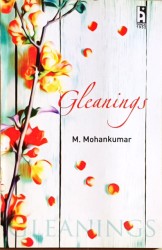by P Ravindran Nayar
For M Mohankumar, poetry is not just a pastime, or something that gives him pleasure during occasional flights of fancy, but indeed a way of life. Even a casual reader of any of his anthologies may chance upon a robust, perpetual and obviously soul-satisfying bond between Mohankumar the man and Mohankumar the poet.
Having spent a whole career in dealing with matters mundane and rather prosaic, it is perhaps with a vengeance that this former top bureaucrat of Kerala took to poetry in his retired life. The intimations of such immortality came towards the fag end of his career as Chief Secretary to Kerala Government. But once started there was no slowing down or turning back. It was poetry all the way. He produced two volumes of poems while in service and six volumes after superannuation, the latest being ‘Gleanings’ which came out in the fall of 2016.
Some people have a fascination for words. The celebrated writer and journalist Malcolm Muggeridge, for instance, said he had always ‘loved words and still love them, for their own sake. For the power and beauty of them, for the wonderful things that can be done with them.’
As for Mohankumar, the love affair with words was given a poetic expression long back in 1998, in the very first poem in his very first anthology, Pearl Diver:
‘In this room. Am I lonely?’ Mohankumar asks. ‘Not really, I am in lively company./For they come flocking into my mind,/Like a flock of sheep. Words./To give utterance to thoughts.’
And what kinds of words? ‘The long ones and the short, /Some pleasing to the eye,/Some sounding soft, some harsh./Some plain but elegant. /‘Each word has its value……And in their proper place/They make good prose or verse.’
And he writes poems because ‘It comes as the wind /And when it comes, I capture it/ And set it down on paper, not let it/Die in my heart.’
‘Gleanings’ is a collection of 69 poems many of which are nostalgic vignettes of people and places that filled his life long ago and far away. Fond memories of his un-schooled but self-taught mother and the gems of worldly wisdom she conveyed to her children get the prime of place as the first poem in the anthology, perhaps as a long delayed tribute to a mother from a grateful son. In an age when authoritarian patriarchs of joint families would never even dream of sending girl children of the family to school, it was only natural that his mother, despite her fervent wishes for formal education, had to remain cloistered within the four walls of the nalukettu. Marriage provided a brief escape route but once her husband went abroad for work, her life reverted to the old gloomy interiors of the family mansion. Then how did she overcome the unenviable situation. When her children went to school, she made herself her own teacher, poring over the school texts, with determination and grit. ‘Books became the chief delight of her life.’ And what is his lasting memory of his mother?
One picture persists in my memory: Mother,
Old and frail, seated in her rocking chair,
Peering over her glasses, as I enter the room,
interrupting her reading. Then she would
air her views on men and matters, speaking
in the assured tone of a judge, always ending with
the refrain: ‘If only they had sent me to school!’
the tinge of sadness in her voice unmistakable.
There are other poems on his mother and his childhood, like My Mother’s Music Lessons, The Wristwatch, The Wonderland of My Childhood and Last Night in the Ancestral House etc and in each of them he gives a tender touch to his recollections. The music lessons given by his mother, that more than music taught him eternal values, the gift of a wrist watch from her that he still cherishes and retains as a mascot, and the scary night spent by him in the ancestral home before its demolition are all poems that masterfully conjure up images that linger on much after the reading is over.
Along with fond memories of a blissful past, there are also memories of pain and anguish that refuse to go. In Journey’s End he laments the loss of his loved one, saying ‘Memories are wounds that refuse to heal.’
He cannot get adjusted to the fact of her loss. ‘The manner of your leaving, so sudden / and without a word, still confounds me…. On the vast shores of this wide world/ I stand alone, benumbed and speechless,’ he says. Then ‘there is nothing but emptiness/ within and without.’
Other autobiographical poems include ‘Solitude’ that disturbingly brings out the harshness of the solitude that surrounds him at home where he is all alone, his wife gone and son and daughter in distant lands. Normally one yearns for solitude and a quiet corner in a house resounding with activities. ‘Then suddenly, the house falls silent, and you/ find yourself alone, and face it: solitude / in all its hideousness, and dread the prospect/ of its perpetual company.’
When ‘absolute silence reigns absolutely’ you walk through the crowded thoroughfare, but ‘Returning, you ring up an old acquaintance/ and engage him in long, meaningless chatter:/ but there it is, stalking you like a beast of prey,/ ready to plunge its teeth into your throat.’
The same sombre note is reflected in the poem The Shadow in which he says he has his shadow alone for company in his house. As a child, he was afraid of shadows and his mother had told him not to look at them. After a time, he got over the fear and even played with his shadow on the wall. Then ‘It came out with me in the open,/walked when I walked, ran when I ran/sometimes taller, sometimes shorter.’
It has roamed the world with me,
It was with me up in the air and
down in the doldrums. It was with me
on the deck and in the dock. And now
in this empty house.
There are poems that touch upon his career and occasional unpleasant encounters with uneasy bosses, poems that are humorous and poems that make a word play, like ‘Verbivore.’ In The Choice, the boss gives him ‘absolute freedom to choose between the two.’ But that is no freedom, he tells the boss, ‘I have the right to choose or not to choose or to choose something else… The boss tries to browbeat him into submission, but ‘I would not buckle under pressure/ I faced him frontally. To my surprise/ He dropped the mask and waved me away.’
‘Gleanings’ by M Mohankumar
Prabhat Book House,
Thiruvananthapuram
ISBN : 978-81-7705-567-2
Pp 92 Rs 140






